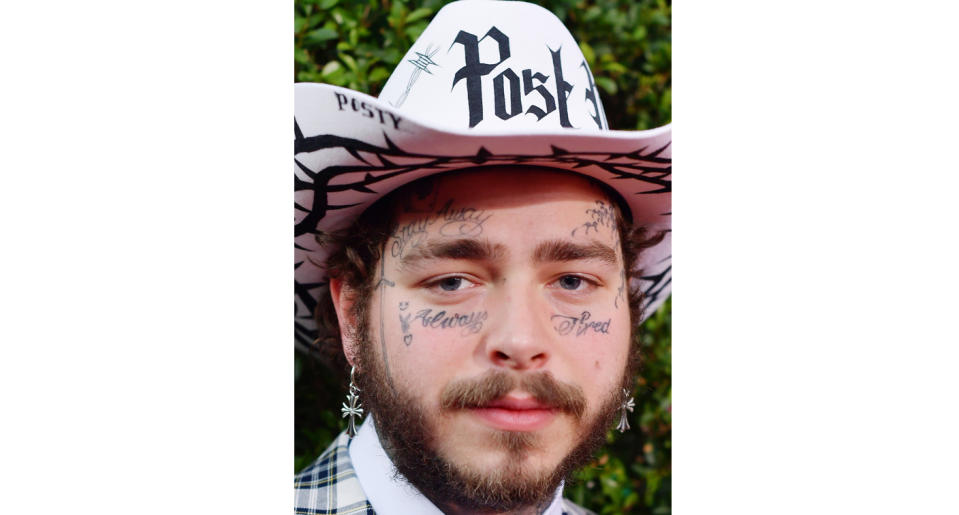The hidden meanings behind celebrity tattoos, revealed — from Amy Winehouse to Post Malone


When remembering Amy Winehouse, it’s impossible not to visualize her vast and beautiful collection of body art. The iconic pinup woman on her right arm, the lightning bolt on her wrist and the name “Cynthia” — inspired by her paternal grandmother — are just three of 14 known tattoos the legendary singer had that gave people a glimpse into her world.
Learn more about Winehouse’s tattoos by exploring the art in 3D.
Two of the “Rehab” singer’s most meaningful tattoos — including the famous pinup piece that was etched on her upper arm — paid homage to her grandmother Cynthia, whom Winehouse was very close with until she lost her battle to breast cancer in 2006 (the same year Winehouse released her second album, Back to Black). Cynthia was also a singer and hugely inspirational to her granddaughter. So it’s no wonder Winehouse wanted to honor her life with some bespoke body art.
“She was a kind of beacon for Amy,” said the singer’s former tattoo artist and good friend, Henry Hate, in a past interview. “It was only later on in our friendship [when] she showed me a photo of Cynthia in her youth and I could see she had been a real head-turner,” he added. Given their strong connection, some believe Cynthia’s death contributed to Winehouse’s drug and alcohol addiction — a disease that took the talented young Londoner’s life in 2011, at just 27.
While we’ll never know for sure, there’s a solid chance Winehouse got these tattoos for her grandmother as part of the grieving process. (Almost like her way of saying goodbye.) After all, tattoos were a major form of self-expression for the British vocalist — another outlet, just like singing — so it’d definitely make sense if that’s what she did, even if it was done subconsciously.
“Looking at Amy Winehouse’s tattoos, and as a huge fan of her music, I believe that she was an extremely passionate soul who literally wore her heart on her sleeve,” says Beverly Hills-based tattoo artist Katrina “Kat Tat” Jackson. “I feel that her tattoos were not premeditated or thought out for years, but rather spontaneous and representative of her strongest emotions at the time that she got each piece done.”
Moreover, licensed psychologist Karen Bridbord says she has seen myriad people get tattoos to help heal from grief and loss. “The tattoo process is a journey where the recipient keeps alive what is no longer through one's own physical body,” she explains. “It's a way to hold on to — through physical representation — who or what is most important to them.”
In Winehouse’s case, it seems she wanted to hold on to her grandmother Cynthia — a woman who fully encouraged her to be the unforgettable artist she was and remains to fan.
More meaningful celebrity ink
Of course, Winehouse is far from the only celebrity who’s used body art as a way to work through adversity and express themselves mentally and emotionally.
Ariana Grande — who reportedly has over 50 tattoos now — got a tribute piece for her ex-boyfriend the rapper Mac Miller, who died suddenly of a drug overdose in 2018. In a similar vein, Lady Gaga honored her father with some ink shortly after he underwent open-heart surgery in 2009. (Thankfully, he lived to see it.) Then there’s Demi Lovato, who had “Stay Strong” famously tatted on her wrists after getting out of rehab, where she was treated for self-harm and bulimia in 2010.

As world-renowned ink expert Keith “Bang Bang” McCurdy explains: “Tattoos can relate to someone’s mental and emotional health in a lot of ways — both good and bad. They can reflect past traumas or something that happened to someone that’s marked them so much internally, that they want to visualize it externally. And then the same can happen on the opposite spectrum. Something really eventful or meaningful in someone’s life can make such an impact on them that they want to visually represent the way they feel internally.”

Other A-listers who have tattoos with heartfelt meanings include the likes of Miley Cyrus, who has “Just Breathe” tattooed on her rib cage for her deceased dog Floyd; Sophie Turner, who has the letter "G" inked on her pinky finger in honor of her grandfather; and Selena Gomez, who, along with the crew of 13 Reasons Why, got a tiny semicolon tattoo on her wrist to support Project Semicolon, a nonprofit that helps those affected by suicide, depression and self-harm.
From a psychotherapy standpoint, tattoos can serve as a “window to emotions and experiences that might otherwise be hidden.” Or at least that’s how Los Angeles-based psychiatrist and co-author of Tattoos as a Window to the Psyche, Joseph Pierre, MD, puts it. “Essentially, tattoos can represent a way of expressing something personally meaningful without actually having to speak it,” he says.
Another translation: When people can’t find a way to put what they’re feeling into words, they turn to body art to help them express what they can’t find within themselves to say.
Celebrity tattoos and mental health awareness
Taking the topic of mental health and body art a step further, in certain instances, tattoos can actually help raise awareness — almost acting as a vessel, if you will — that has the ability to highlight how someone is really feeling inside, or spark a conversation that leads to a discussion about mental health.

Take Selena Gomez’s semicolon tattoo. The “Rare” singer could easily spread awareness and champion mental health issues simply by talking about the significance of her tattoo with her fans, friends and family members — not to mention the strangers on social media who inquire about it. And this works twofold: It educates folks about a mental health organization to support and works to normalize discussing these all-too-important subjects at the same time.
Body art can also be a powerful vehicle for healing — not only from grief over losing a loved one, but from traumas both big and small that occur throughout life, such as sexual assault, domestic abuse or even a bad breakup. For instance, Bridbord says that, as a psychologist, she has often explored the personal meaning that a tattoo has to a patient, and that this has proved to be a beneficial tactic in her work. “It ultimately serves as an opportunity to explore core aspects of a person's self-identity, which aids in the treatment process,” she explains, adding that tattoos “reflect elements of our psyche,” which is why they’re so often related to our mental health.

Shifting gears just a bit, some experts compare tattoos to scars in that they silently echo what you’ve been through and all of the strength you’ve amassed along the way. New York-based tattoo artist Eva Krbdk examines how, similar to scars, tattoos can be a reflection of our inner struggles — as well as a symbol of courage — and why that’s so powerful.
“For those who struggle with mental health, ‘Wearing your heart on your sleeve’ publicizes your vulnerability, your understanding, your commitment and, in the process, motivates others to open up,” she says. “Just as Post Malone’s iconic face tattoos ‘Stay Away’ and ‘Always Tired’ reflect on his inner struggles, tattoos can give us the chance to see a stranger’s deepest fears and most cherished ideals, and even though this stranger might be living a life unlike ours, when we get a glimpse of the soulful tattoos on their skin, we can see they’ve struggled through dark times just like we have.”
In other words: Tattoos can foster human connection and compassion for others. Just by looking at someone’s body art, whether it be on a friend, celebrity or total stranger, you’re given a glance at what they love, what they’ve lost and what they’re maybe still working on — and in turn, you likely feel more connected to them. Just consider how much closer many of Demi Lovato’s fans must have felt to her when she revealed the meaning behind her “Stay Strong” tattoo. Today when they see it, they’ll be reminded of what the singer’s been through — that, and if they’re struggling with similar issues, they’ll remember they’re not alone.

Now, looking back on Winehouse’s tattoos, especially the ones for her grandmother, it’s hard not to feel connected to her. And the same goes for other inked-up celebrities who wear their hearts on their sleeves too. When it comes down to it, tattoos are uniquely personal — just like our DNA — but what’s not unique is the ultra-powerful connection they build among all of us. Think about that the next time your favorite celebrity gets a new tattoo.
This article is supported by Reelz. It is editorially independent, with no influence or input from the brand.


